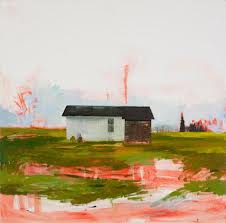Stephen Hayes was born and raised in Washington D.C. where his earliest memory of an interest in art is of a drawing he made with silver crayons of John Glenn and his “Rocket Ship” in 1960 something. He was about six.
The mature artist, Stephen Hayes, received his MFA from the University of Wisconsin in Madison in 1980, having focused on drawing and specifically on drawing the human form. His studies took him as far as a full dissection of the cadaver via the University Medical School, culminating in a thesis on portraiture.
Immediately following graduate school, Hayes moved to the Middle East for nearly four years where he was overwhelmed by the awesome beauty of the Cypriot landscape. It was there that his interest in the land as a vehicle for expression of human condition began. His travels and work in Lebanon, Syria, Jordan, Bahrain and Cyprus planted a seed that is still bearing fruit in his work today. While his landscape paintings are rarely populated, there is always the sense that we have knowledge of the place, or the mood, or the potency of place. This quality is a result of years spent walking alone through natural and often rugged beauty, and drinking that quality in to the core.
In 1984 Hayes moved first back to Washington for a brief stint at the Phillips Collection as one of their Museum Assistants, and then within six months decided to go somewhere unknown. He headed west and settled in Portland, Oregon where he currently lives. He continues through his painting and print work, to translate, viscerally, the physical and emotional experience of places of nature.
In the roughly 25 years that Hayes has spent working and teaching in Portland he has participated in scores of exhibitions and produced dozens of one-man shows of his paintings, prints and drawings. Hayes has received awards that include a WESTAF Individual Artist Fellowship, an Oregon Arts Commission Individual Artist Fellowship, and is a 2011 recipient of the Hallie Ford Fellowship for Individual Artists.
He is represented in Portland by the Elizabeth Leach Gallery and his work can be found in numerous private, public and corporate collections throughout the United States, as well as in Europe, Japan and South America.

